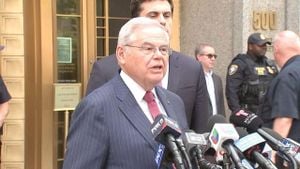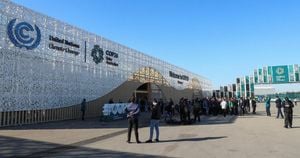With the ink barely dry on the 2024 election results, the specter of Donald Trump’s return to the Oval Office has sparked intense discussions among Democrats, Republicans, and various interest groups across the nation. Four years have passed since Trump's first term ended, but as he prepares for his anticipated second term, the ripple effects are already being felt—especially among state leaders and political organizations.
During Trump's first presidency, California was known for its vocal opposition to his policies, often challenging his administration with legal actions about every 12 days on average. The Golden State became a battleground, and now, as Trump gears up to reclaim the presidency, Democratic leaders, including Governor Gavin Newsom, are readying for round two.
Newsom has announced the intention to convene a special legislative session, starting on December 2, aimed at setting aside funds for potential lawsuits against the incoming administration. This proactive plan is immensely symbolic of California’s resilient stance against what they perceive as federal overreach. He explicitly stated, "California will seek to work with the incoming president — but let there be no mistake, we intend to stand with states across our nation to defend our Constitution and uphold the rule of law.”
Attorney General Rob Bonta has also been laying groundwork for defensive measures, facing the possibility of aggressive shifts in policies from the Trump administration. He expressed confidence, stating, “We bring cases when we believe we will win, when we’ve done the due diligence.” This sentiment reflects the broad concern among Democrats about the ramifications of Trump’s return to power, especially as he has made significant promises to his base to roll back various regulations introduced by previous administrations.
Meanwhile, national discourse surrounding Trump’s impact extends beyond the California state line. For the Catholic Church, Trump's second term poses complex challenges, particularly concerning his stances on abortion and immigration. Recently convening for their annual fall meeting, U.S. Catholic bishops found themselves mulling over issues heavily influenced by the newly elected president. Trump’s duality as both anti-abortion and yet inconsistent on policies surrounding the matter leaves many Catholics with some uncertainty.
His administration's chaotic response to immigration also weighs heavily on religious leaders. Trump has promised to carry out extensive deportation measures, igniting concerns among bishops like Mark Seitz of El Paso, Texas. “We hear the fear they live with every day,” Seitz noted, outlining the emotional toll and uncertainty faced by families and migrants amid stricter policies. Yet, Archbishop Thomas Wenski of Miami offered cautious optimism, believing Trump may have to adapt his hardline policies to maintain economic growth.
The political chess game doesn't stop there. With abortion at the forefront of Trump's agenda, bishops have increased their focus on promoting life and dignity as Catholic teaching demands. This includes addressing potential ballot measures and weighing public sentiments on state-level abortion rights. Bishop Michael Burbidge of Arlington stated, "We will never be able financially to keep up with those who are fighting to legalize abortion.” His observation encapsulates the uphill battle anti-abortion advocates face as public opinion increasingly sways toward liberalization.
Marrying the twin issues of abortion and immigration could prove to be pivotal as Trump's administration moves forward. With promises of tougher immigration enforcement, it raises questions for the Catholic bishops who often provide aid to both citizens and non-citizens alike.
While Trump embarks on policies potentially aligning with conservative values, the reality of governing often contradicts campaign rhetoric. Observers wonder how much of his idealistic vision for America can be brought to fruition amid Congress’s checks and balances.
Yet there’s more at play. Many polls suggest Trump has fortified his support among Catholic voters since 2020. Data indicates 54% of Catholic voters backed Trump, with stark divisions across racial lines—while about 60% of white Catholics supported him, 60% of Latino Catholics sided with Vice President Kamala Harris. These demographics can significantly influence politics, especially as Republican strategies focus on garnering broader appeal beyond their traditional bases.
Back at the grassroots, local California leaders are brainstorming ways to defend state laws against potential federal interference. Recent legislative victories have bolstered the sense of urgency to get the framework ready for the coming term. Newsom’s legislative plans may also lay groundwork for seeking justice through state courts rather than federal, framing the national political approach as states’ rights versus federal scrutiny.
Meanwhile, Trump’s potential influence touches realms often overlooked by the political fray, including business dynamics and economic strategies. Many economists have raised alarms over the possibility of tax cuts and deregulations he may seek to reintroduce, which could benefit billionaires significantly. While many view these policies skeptically, those with affluent interests see potential opportunities for increase profit margins.
Nevertheless, the compounding effect of Trump’s past decisions still looms large, affecting the lives of ordinary Americans as much as high-profile individuals. Many leaders across sectors are uniting against what they describe as the potential for destructive policies stemming from intolerance toward marginalized communities.
With Trump’s presidency potentially having ramifications extending far beyond domestic policy—as seen during his first term; issues of foreign policy, climate change, health care, and social justice loom as significant challenges for various factions.
Looking beyond the electoral consequences of Trump’s methodology, discussions about immigration reform remain on the table. The general consensus among activists remains firmly entrenched against mass deportation as the preferred choice among voters—a fact not lost on Trump. Nevertheless, the anticipated strategies from minority groups have created new dialogue dynamics on Capitol Hill as they face off against entrenched interests poised against reforms.
Everyone, from state leaders to everyday citizens, waits to see how this dramatic narrative will unfurl. Will Trump’s approach incite new battles across the states? How will California’s progressivism stand up against the waves of conservative influence? It remains to be seen, but one thing is crystal clear: Americans are preparing for the civic confrontation of the decade as old battles re-emerge, wrapped around the ever-evolving dynamics of U.S. politics.
And so, as the country stands on the brink of another chapter under Trump’s leadership, the responses from both political and religious realms will undoubtedly shape the narrative of future policies and practices alike. The stakes have never been higher, and the tensions between national and local governance offer perhaps the truest test yet of America's commitment to democratic principles and civil rights.



